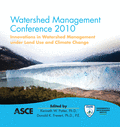Nationwide Watershed Modeling to Evaluate Potential Impacts of Climate and Land Use Change on Hydrology and Water Quality
Publication: Watershed Management 2010: Innovations in Watershed Management under Land Use and Climate Change
Abstract
Managing the impacts of future climate and land use change on hydrology and water quality should benefit from an improved understanding of watershed response to change. EPA ORD is evaluating the impacts of climate change and urbanization on hydrology and water quality in 20 major river basins throughout the United States. The approach involves application of dynamic watershed models, HSPF and SWAT, to simulate historical conditions and a range of potential climate and landuse changes scenarios. While most climate change impacts studies focus on hydrology, this unprecedented effort also evaluates nutrient and sediment impacts. Study results will improve our understanding of system sensitivity to climate and land-use change in different regions of the country, and provide a range of plausible scenarios of future hydrologic and water quality change that can be applied in various planning and scoping frameworks. By investigating a number of methodological issues, it will also provide guidance and a template for conducting similar studies in other regions of the United States and internationally. The first phase of the project involved selection of representative watersheds from across the country. Selection considered technical and programmatic concerns, such as variability in climate, precipitation extremes, watershed characteristics, ecosystem types, and settlement types, as well as proximity to large-scale monitoring studies, overlap with other EPA projects, and coverage of EPA regions. Subsequently, a detailed approach to configuring and executing the SWAT and HSPF models was conceived and tested. Because SWAT and HSPF models are both being used to simulate the initial set of watersheds, the approach was developed to optimize efficiency in model configuration and to ensure consistency in assumptions. Lessons learned from previous climate change hydrology modeling studies resulted in particular emphasis on appropriate representation of hydro-meteorological factors, such as potential evapotranspiration. Model application for 5 pilot watersheds throughout the country comprises the second project phase. Pilot watersheds include the Minnesota, Apalachicola-Chattahoochee-Flint, Susquehanna, Willamette, and Salt/Green/San Pedro. HSPF and SWAT models of the pilot watersheds have been calibrated and validated for an extended time period to most accurately represent hydrologic regimes and water quality conditions. Meteorological datasets representing a suite of potential climate change scenarios for the period 2040–2070 have been developed using statistics derived from the North American Regional Climate Change Assessment Program (NARCCAP), the Bureau of Reclamation,and tools such as the BASINS Climate Assessment Tool (CAT) and the SWAT Weather Generator. These datasets are being combined with scenarios of future land-use change (residential and urban) developed by EPA. Taken together, all of these scenarios provide a basis for evaluation of climate change alone, land use change alone, and combined effects of climate and land use change. The third and final phase will consist of simulations in the remaining 15 non-pilot basins but using only one of the watershed models. A range of hydrologic and water quality endpoints are being determined for each simulation. Endpoints include mean monthly and mean annual stream flow, flood events, low flow events, the date of annual runoff center of mass, and mean monthly and mean annual nitrogen, phosphorus, and sediment loads. Additional endpoints will be identified and evaluated to fully inform upon a range of stream flow, water quality, aquatic ecosystem, and EPA program management goals and targets. Comparisons will be made within watersheds and across watersheds to provide a comprehensive assessment of potential climate change implications.
Get full access to this article
View all available purchase options and get full access to this chapter.
Information & Authors
Information
Published In
Copyright
© 2010 American Society of Civil Engineers.
History
Published online: Apr 26, 2012
ASCE Technical Topics:
- Climate change
- Climates
- Engineering fundamentals
- Environmental engineering
- Hydrologic engineering
- Hydrologic models
- Hydrology
- Infrastructure
- Land use
- Models (by type)
- River engineering
- River systems
- Urban and regional development
- Urban areas
- Water and water resources
- Water management
- Water quality
- Water treatment
- Watersheds
Authors
Metrics & Citations
Metrics
Citations
Download citation
If you have the appropriate software installed, you can download article citation data to the citation manager of your choice. Simply select your manager software from the list below and click Download.
